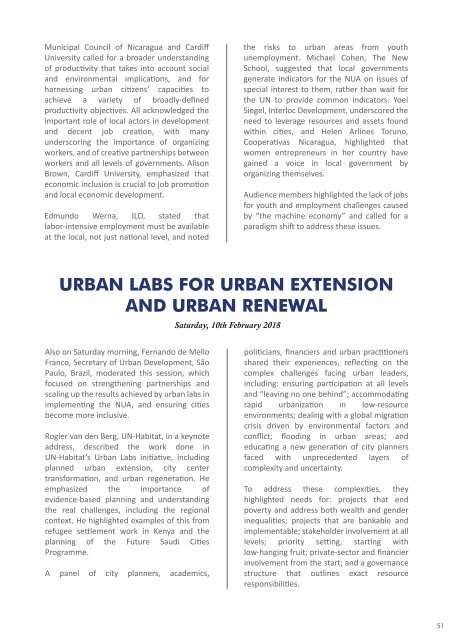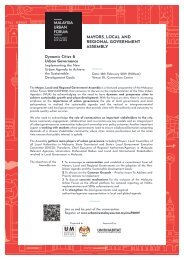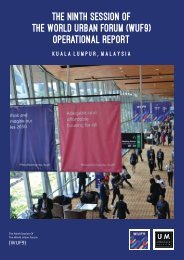WUF9 Substantive Report-s
You also want an ePaper? Increase the reach of your titles
YUMPU automatically turns print PDFs into web optimized ePapers that Google loves.
Municipal Council of Nicaragua and Cardiff<br />
University called for a broader understanding<br />
of producvity that takes into account social<br />
and environmental implicaons, and for<br />
harnessing urban cizens’ capacies to<br />
achieve a variety of broadly-defined<br />
producvity objecves. All acknowledged the<br />
important role of local actors in development<br />
and decent job creaon, with many<br />
underscoring the importance of organizing<br />
workers, and of creave partnerships between<br />
workers and all levels of governments. Alison<br />
Brown, Cardiff University, emphasized that<br />
economic inclusion is crucial to job promoon<br />
and local economic development.<br />
Edmundo Werna, ILO, stated that<br />
labor-intensive employment must be available<br />
at the local, not just naonal level, and noted<br />
the risks to urban areas from youth<br />
unemployment. Michael Cohen, The New<br />
School, suggested that local governments<br />
generate indicators for the NUA on issues of<br />
special interest to them, rather than wait for<br />
the UN to provide common indicators. Yoel<br />
Siegel, Interloc Development, underscored the<br />
need to leverage resources and assets found<br />
within cies, and Helen Arlines Toruno,<br />
Cooperavas Nicaragua, highlighted that<br />
women entrepreneurs in her country have<br />
gained a voice in local government by<br />
organizing themselves.<br />
Audience members highlighted the lack of jobs<br />
for youth and employment challenges caused<br />
by “the machine economy” and called for a<br />
paradigm shi to address these issues.<br />
URBAN LABS FOR URBAN EXTENSION<br />
AND URBAN RENEWAL<br />
Saturday, 10th February 2018<br />
Also on Saturday morning, Fernando de Mello<br />
Franco, Secretary of Urban Development, São<br />
Paulo, Brazil, moderated this session, which<br />
focused on strengthening partnerships and<br />
scaling up the results achieved by urban labs in<br />
implemenng the NUA, and ensuring cies<br />
become more inclusive.<br />
Rogier van den Berg, UN-Habitat, in a keynote<br />
address, described the work done in<br />
UN-Habitat’s Urban Labs iniave, including<br />
planned urban extension, city center<br />
transformaon, and urban regeneraon. He<br />
emphasized the importance of<br />
evidence-based planning and understanding<br />
the real challenges, including the regional<br />
context. He highlighted examples of this from<br />
refugee selement work in Kenya and the<br />
planning of the Future Saudi Cies<br />
Programme.<br />
A panel of city planners, academics,<br />
policians, financiers and urban praconers<br />
shared their experiences, reflecng on the<br />
complex challenges facing urban leaders,<br />
including: ensuring parcipaon at all levels<br />
and “leaving no one behind”; accommodang<br />
rapid urbanizaon in low-resource<br />
environments; dealing with a global migraon<br />
crisis driven by environmental factors and<br />
conflict; flooding in urban areas; and<br />
educang a new generaon of city planners<br />
faced with unprecedented layers of<br />
complexity and uncertainty.<br />
To address these complexies, they<br />
highlighted needs for: projects that end<br />
poverty and address both wealth and gender<br />
inequalies; projects that are bankable and<br />
implementable; stakeholder involvement at all<br />
levels; priority seng, starng with<br />
low-hanging fruit; private-sector and financier<br />
involvement from the start; and a governance<br />
structure that outlines exact resource<br />
responsibilies.<br />
51






